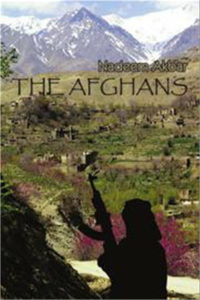
The Afghans
Nadeem Akbar
AuthorHouse (2008)
Rs995
A family scattered by Afghanistan’s turmoil struggles to reconnect in Nadeem’s affecting debut.
During the chaos following the 1979 Soviet invasion of Kabul, Afghanistan, well-to-do housewife Bibi Gul’s government-minister husband is killed, and her two young sons go missing. The novel follows the fragmented clan through 30 years of tumult and wandering. Bibi’s oldest son, Saleem, is taken in by a kindly truck driver, while his brother, Bilal, stricken with amnesia, winds up in an orphanage where he is adopted by an abusive Russian official and his doting wife.
Meanwhile, Bibi Gul raises her youngest son, Adib, in Peshawar, Pakistan, until he goes off to the United States, where he finds financial success and an American girlfriend—but retains an abiding sense of loneliness. Meanwhile, Bibi Gul and her father, a tribal chieftain and mujahedeen leader, keep trying to reunite the family, which leads to both joyous reunions and awkward readjustments. Akbar’s multistranded saga soft-pedals the upheavals of Afghanistan’s war and tyranny; there are few scenes of overt violence as the Russian occupation gives way to warlords, Taliban rule and the post-9/11 U.S.–led invasion. Instead, the author paints a quiet, nuanced portrait of the tensions in a state where clan and tribal loyalties are the only defense against insecurity. (At one point, a character is declared a traitor by other characters after he blows the whistle on a fellow tribesman’s drug-smuggling operation.) The author views Afghan society mainly through the lens of the Pashtun diaspora; much of the action takes place in Pakistan, Moscow and New York, and the story revolves around themes of conflicted identity and cultural estrangement. Bibi Gul’s sons never quite feel that they belong in the far-flung locales they live in, yet they find it painful to go home to a land and family that now seems unstable, backward and constricting—especially to the women in their lives. Although Akbar’s prose can be a bit stilted at times, she often writes with perceptiveness and pathos about the intimate losses that came out of Afghanistan’s troubled history.
Nadeem Akbar has written children’s books for many years that have been used as part of the curriculum in several Pakistani schools. This is her first narrative. The author is fully able to convey the feelings and aspirations of fellow Afghans with candor and style being an Afghan herself. Her family migrated from Afghanistan in the nineteenth century. Nadeem Akbar is from Lahore, Pakistan but currently lives in London, England with her husband.
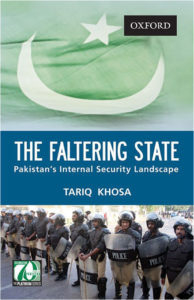
The Faltering State: Pakistan’s Internal Security Landscape
Tariq Khosa
OUP (2007)
Rs1,425
This book reviews the recent internal security challenges facing Pakistan. It is a timely and valuable addition to the literature on the subject of governance and the rule of law. It is based on the author’s approximate four decades (1973–2011) of creditable public service and provides special insights into how Pakistan, as a state, has been mismanaged at all levels. Bringing a practitioner’s expertise, it will no doubt serve to inform the interested readership and stimulate debate on an issue that is of central importance to the survival of Pakistan as an effective state.
Tariq Khosa graduated from the National Defence University, Islamabad. He completed his Master’s in Defence and Strategic Studies in 2005 and was a Hubert Humphrey Fellow under the Fulbright Exchange Program at the Graduate School of Public Affairs, University of Washington, Seattle in 1987–88.
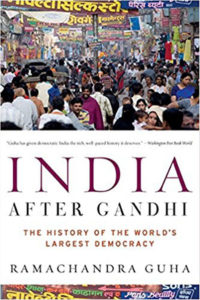
India After Gandhi: The History of the World’s Largest Democracy
Ramachandra Guha
Harper Perennial (2008)
Rs1,595
India is the country that was never expected to ever be a country. In the late 19th century, Sir John Strachey, a senior British official, grandly opined that the territory’s diverse states simply could not possess “any sort of unity, physical, political, social or religious.” Strachey, clearly, was wrong: India today is a unified entity and a rising global power. Even so, it continues to defy explanation. “India’s existence,” says Guha, an internationally known scholar, “has also been an anomaly for academic political science, according to whose axioms cultural heterogeneity and poverty do not make a nation, still less a democratic one.”
Yet India continues to exist. Guha’s aim in this startlingly ambitious political, cultural and social survey is to explain why and how. He cheerfully concludes that India’s continuing existence results from its unique diversity and its refusal to be pigeonholed into such conventional political models as Anglo-American liberalism, French republicanism, atheistic communism or Islamist theocracy. India is proudly sui generis, and with August 15, 2007, being the 60th anniversary of Indian independence, Guha’s magisterial history of India since that day comes not a moment too soon.
Ramachandra Guha is an Indian historian and writer whose research interests include environmental, social, political, contemporary and cricket history. He is also a columnist for The Telegraph and Hindustan Times.
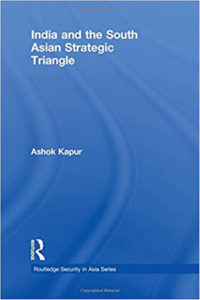
India and the South Asian Strategic Triangle
Ashok Kapur
Routledge (2010)
Rs13,590
This book traces the triangular strategic relationship of India, Pakistan and China over the second half of the twentieth century, and shows how two enmities – Sino-Indian and Indo-Pakistani – and one friendship – Sino-Pakistani – defined the distribution of power and the patterns of relationships in a major centre of gravity of international conflict and international change.
The three powers are tied to each other and their actions reflect their view of strategic and cultural problems and geopolitics in a volatile area.
The book considers internal debates within the three countries; zones of conflict, including northeast and northwest south Asia, the Himalayas and the Indian Ocean; and the impact of developments in nuclear weapons and missile technology. It examines the destructive consequences of China’s harsh methods in Tibet, of China’s encouragement of military rather than democratic regimes in Pakistan, and of China’s delay in dealing with the border disputes with India. Ashok Kapur shows how the Nehru-Chou rhetoric about “peaceful co-existence” affected the relationship, and how the dynamics of the relationship have changed significantly in recent years as a range of new factors - including India’s increasing closeness to the United States - have moved the relationship into a new phase.
Ashok Kapur is Distinguished Professor Emeritus in Political Science, University of Waterloo, Canada. He is author of several major works including India - From Regional to World Power (also published by Routledge), and is co-author of Government & Politics in South Asia, 6th edition.
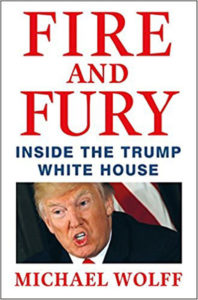
Fire and Fury: Inside the Trump White House
Michael Wolff
Henry Holt and Co. (2018)
Rs1,395
With extraordinary access to the West Wing, Michael Wolff reveals what happened behind-the-scenes in the first nine months of the most controversial presidency of our time in Fire and Fury: Inside the Trump White House.
Since Donald Trump was sworn in as the 45th President of the United States, the country?and the world?has witnessed a stormy, outrageous, and absolutely mesmerizing presidential term that reflects the volatility and fierceness of the man elected Commander-in-Chief.
This riveting and explosive account of Trump’s administration provides a wealth of new details about the chaos in the Oval Office, including:
— What President Trump’s staff really thinks of him
— What inspired Trump to claim he was wire-tapped by President Obama
— Why FBI director James Comey was really fired
— Why chief strategist Steve Bannon and Trump’s son-in-law Jared Kushner couldn’t be in the same room
— Who is really directing the Trump administration’s strategy in the wake of Bannon’s firing
— What the secret to communicating with Trump is
— What the Trump administration has in common with the movie The Producers
Never before in history has a presidency so divided the American people. Brilliantly reported and astoundingly fresh, Fire and Fury shows us how and why Donald Trump has become the king of discord and disunion.
“Not since Harry Potter has a new book caught fire in this way…[Fire and Fury] is indeed a significant achievement, which deserves much of the attention it has received.”(The Economist)
Michael Wolff has received numerous awards for his work, including two National Magazine Awards. He has been a regular columnist for Vanity Fair, New York, The Hollywood Reporter, British GQ, USA Today, and The Guardian. He is the author of six prior books, including the bestselling Burn Rate and The Man Who Owns the News. He lives in Manhattan and has four children.

